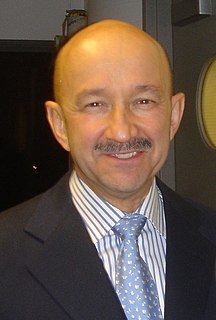A Quote by Nizar Qabbani
There is who loves you quietly, and respects you quietly, and wishes you privately, and walks away when he sees you busy with someone other than him, and his ego restrains him from getting near you, and contents himself with the love for the sake of love
Related Quotes
Instead of encouraging the student to devote himself to his studies for the sake of studying, instead of encouraging in him a real love for his subject and for inquiry, he is encouraged to study for the sake of his personal career; he is led to acquire only such knowledge as is serviceable in getting him over the hurdles which he must clear for the sake of his advancement.
The love of a wife to her husband may begin from the supply of her necessities, but afterwards she may also love his person: so the soul first loves Christ for salvation, but when it is brought to him, and finds what sweetness there is in him, then the soul loves him for himself, and esteems his person, as well as rejoices in his benefits.
I stared at Jean-Claude and it wasn't the beauty of him that made me love him, it was just him. It was love made up of a thousand touches, a million conversations, a trillion shared looks. A love made up of danger shared, enemies conquered, a determination to neither of us would change the other, even if we could. I love Jean-Claude, all of him, because if I took away the Machiavellian plottings, the labyrinth of his mind, it would lessen him, make him someone else.
When you want to direct someone toward the good, first put him at peace bodily and honor him with words of love. For nothing inclines such a man to shame and induces him to cast of his vice and be changed for the better as do bodily goods and honor, which he sees in you. Then, with love tell him a word or two, and do not be inflamed with anger toward him. Do not let him see any cause of enmity toward you. For love does not know how to lose its temper.
To love is good, too: love being difficult. For one human being to love another: that is perhaps the most difficult of all our tasks, the ultimate, the last test and proof, the work for which all other work is but preparation. Love is a high inducement to the individual to ripen, to become something in himself, to become world for himself for another's sake, it is a great exacting claim upon him, something that chooses him out and calls him to vast things.
But a man's best friend is the one who not only wishes him well but wishes it for his own sake (even though nobody will ever know it): and this condition is best fulfilled by his attitude towards himself - and similarly with all the other attributes that go to define a friend. For we have said before that all friendly feelings for others are extensions of a man's feelings for himself.
When K. looked at the castle, often it seemed to him as if he were observing someone who sat quietly there in front of him gazing, not lost in thought and so oblivious of everything, but free and untroubled, as if he were alone with nobody to observe him, and yet must notice that he was observed, and all the same remained with his calm not even slightly disturbed; and really - one did not know whether it was cause or effect - the gaze of the observer could not remain concentrated there, but slid away.
In love at one of its poles you find the personal, and at the other the impersonal. At one you have the positive assertion — Here I am; at the other the equally strong denial — I am not. Without this ego what is love? And again, with only this ego how can love be possible?
Bondage and liberation are not antagonistic in love. For love is most free and at the same time most bound. If God were absolutely free there would be no creation. The infinite being has assumed unto himself the mystery of finitude. And in him who is love the finite and the infinite are made one.
I have this love for Mattie. It was formed in me as he himself was formed. It has his shape, you might say. He fits it. He fits into it as he fits into his clothes. He will always fit into it. When he gets out of the car and I meet him and hug him, there he is, him himself, something of my very own forever, and my love for him goes all around him just as it did when he was a baby and a little boy and a young man grown.
No man could bring himself to reveal his true character, and, above all, his true limitations as a citizen and a Christian, his true meannesses, his true imbecilities, to his friends, or even to his wife. Honest autobiography is therefore a contradiction in terms: the moment a man considers himself, even in petto, he tries to gild and fresco himself. Thus a man's wife, however realistic her view of him, always flatters him in the end, for the worst she sees in him is appreciably better, by the time she sees it, than what is actually there.







































